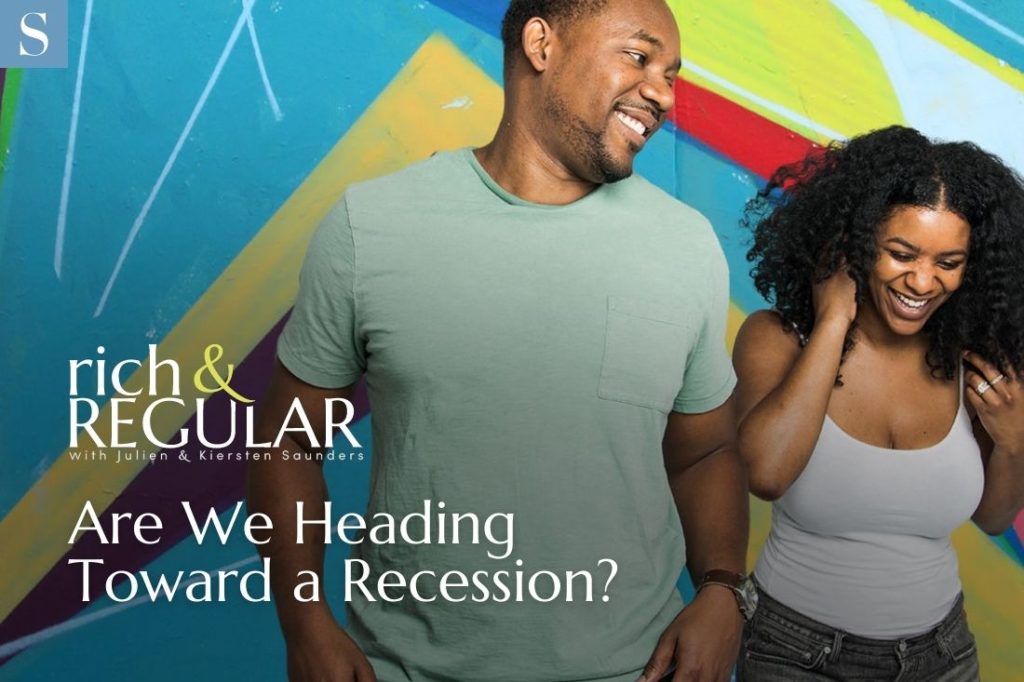As inflation and interest rates start to rise, you may have heard financial experts warn about a possible economic recession. Talk of a recession might have some people remembering the fear and hardships of the Great Recession in 2008, or even the disruption of the COVID-19 recession in 2020, which lasted only two months.
While we can’t control the markets, and won’t know if we’re actually in a recession until several months of economic downturn have already happened, we can take action now to help us come through any problems in the best position possible. A good way to get ready is to take stock of your current financial state while planning for how broader economic problems might affect you. That way, if they do happen, you’ll already have a plan in place and won’t have to worry about what action to take.
Rich & REGULAR with Kiersten and Julien Saunders is no longer releasing new episodes on the SUCCESS Podcast Network, but you can still listen to the full conversation below.

Prepare your money and your mind
Recessions are generally accepted as part of our economic system. Some economists might argue that recessions may not be inevitable, but they typically occur about once every ten years and usually follow periods of strong economic growth. If you lived through the Great Recession (2007-2009), you might be experiencing some uncertainty right now as you wonder what the future will hold.
While any coming downturn is unlikely to last as long as the Great Recession did, being ready to take action if problems arise can help you find peace of mind. To make sure you face any problems in the best financial position possible, consider the following:
Pay off debt
One of the best things you can do to prepare for any financial downturn is to pay off your credit card or other high-interest debt. Eliminating a debt payment from your budget frees up funds for different uses and means you aren’t paying interest on outstanding balances.
Interest on your debt is the flip side of compound interest in investing. While investing over the long term can help you make money and grow your portfolio, the interest on your debt works in the opposite direction. It adds to the total balance you owe and keeps you in debt longer, especially as interest rates rise.
Work to pay off as much debt as possible now so that you don’t have to worry about it during a potential recession. Develop a plan to accelerate repayment and see if there are places in your budget that you can cut back, or think about a side hustle or second job to help you pay off debt.
Beef up your emergency fund
Once you’ve paid off as much of your high-interest debt as possible, start to focus on your emergency fund. Having a healthy savings account can make tough economic times easier. Aim to have about six months of living expenses in an easy-to-access fund so that if you are laid off, you don’t have to rely solely on unemployment or other assistance programs.
Saving six months’ worth of living expenses can seem impossible, but focus on slowly building up your savings over time. Make small, incremental savings goals to keep you motivated as you move toward a larger purpose, or automate your savings contributions so they happen without needing to think about it.
Identify places to cut back
While you build your emergency fund and develop a plan to pay off debt, take some time to identify expenses in your budget that you can reduce or remove. If you keep a formal budget or use budgeting software, try creating a basic budget for only necessities to see how much you really need per month. Once you have that number, mindfully consider the rest of your budget categories and determine the order you’d remove them in if it becomes necessary.
You don’t have to make any cuts yet, but identifying where you want to start can help you avoid making changes in a panic. Doing this can make it easier to follow through when you do need to make cuts since you have already weighed the cost and benefit of each category and can make better choices.
Develop your skills and education
It can be challenging to focus on what’s in our control when we feel like the world is falling apart. Before fear and uncertainty take hold, spend some time brainstorming what you would do if you did lose your job and try to identify the elements of the situation that are in your control.
You can’t prevent an economic downturn or layoffs, but you can make sure you’re in the best position possible to avoid or prepare for a job loss. Brainstorm what would happen if you were laid off. Consider the changes you would need to make and any skills that would make finding a new job easier. If you’ve been thinking about going back to school or devoting time to upskilling, now might be a good time to pursue it so that not only are you a more attractive employee at your current job, but you also have new skills that will be in demand if you did experience a job loss.
Try to ignore the news
Do your best not to react to the daily ups and downs in the financial news. Your stock portfolio may lose money in the short term, but remember that you’re invested for the long haul. Avoid panic selling at the first sign of trouble, and make sure that if you do need to pull money out of the market, you understand any taxes, fees or penalties you may owe based on the type of accounts you have, as well as the lost opportunity cost for future growth.
Final Thoughts
Since we can’t control the economy, it’s essential to focus on what we can control, like paying down debt, beefing up our emergency savings, increasing our skills, and being mentally ready to make cuts or hard choices. Making sure you’re prepared for whatever comes in the future can go a long way to making sure you come out the other side with your finances and sanity intact.










